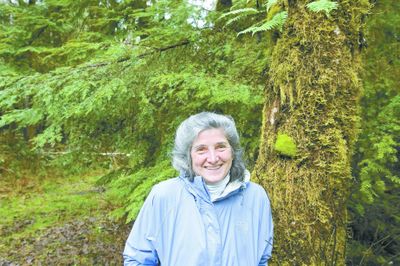Fish-Wildlife Commission chair still learning despite multiple degrees

NASELLE, Wash. – Meet Miranda Wecker, environmental lawyer, spartina eradication expert, enthusiastic mountain biker and skier – and new chair of the Washington Fish and Wildlife Commission.
Six weeks into her position as leader of the group that sets policy for the Department of Fish and Wildlife, Wecker talked about commission politics, the struggles over spring chinook and other issues.
The soft-spoken Wecker, 58, is a big-city native living in the small towns of southwest Washington.
Wecker, who grew up in Chicago, earned a degree in psychology from Pomona College in California and then spent three years sailing a 40-foot boat to the South Seas.
She worked in the Olympic National Forest for a few years before getting two law degrees from the University of Washington, one of them an advanced degree in marine law. Then came six years in Washington, D.C., explaining multilateral treaties to the Council on Ocean Law.
Wecker came back to the other Washington in 1991, doing consulting work for several non-profit natural resources groups including the Willapa Alliance. As she put it, her job was working to try to find solutions “through a combination of law and policy.”
Since 1995, Wecker has been the marine program manager for the UW’s Olympic Natural Resources Center, which has offices in Forks. She spends much of her time working on Willapa Bay issues and lives near Naselle.
One of her major efforts is the control of spartina, the non-native grass that has threatened to take over the bay’s mud flats. Extensive spraying and other weed-control methods have beaten spartina back in recent years.
It’s spartina, not salmon or steelhead, that brought Wecker to the Fish and Wildlife Commission.
When Gov. Chris Gregoire first took office in 2005, Wecker decided to apply for the commission. “My motivation was I saw the agency performing well in some areas, some not so well,” Wecker said. “I wanted improvement in controlling spartina in Willapa Bay.”
Wecker applied on Gregoire’s Web site – and was appointed.
At the time, Wecker said, “I knew nothing about the commission. I had very little understanding of how the agency was managed. It was obscure to me. It’s a complex agency.”
The fish and wildlife commissioners are supposed to focus on the big picture, rather than day-to-day operations of the DFW, she learned.
“The number one job is preservation and protection of our natural heritage, the land that we manage, and allowing uses that are consistent with conservation,” she said. “There are a number of audiences we serve – the general public is one,” as opposed to just hunters or anglers.
After four years of attending commission meetings, however, Wecker is well aware how contentious the nitty gritty of agency management can be, as sport and commercial fishermen lobby for bigger shares of the catch and hunters vie for special permits.
“I am one of the two (commissioners) who has never really hunted much,” Wecker said. But the other five are hunters, as is her husband. “We have no trouble finding expertise” on hunting issues, she said.
Wecker has received a crash course in fishery issues by serving on one of the committees that tried to come up with a framework for allocating spring chinook between sport and commercial fishermen.
The Washington commission adopted a plan advanced by a later bi-state committee, but the Oregon Fish and Wildlife Commission wants a bigger share of the spring chinook for commercial fishermen.
Wecker said the current makeup of the commission, with two fisheries Ph.D.s, an ecologist and an environmental lawyer, has more people with natural resource backgrounds than in years past.
“There’s been a real effort to be to be fair, to have a conservation emphasis. Maybe that’s come off as being reform-minded,” she said.
Commissioners are appointed by the governor and supposedly confirmed by the state senate. However, only one of the current seven commissioners has been confirmed. After four years on the commission, Wecker is not yet confirmed.
She had no comment on the implications of the senate’s non-confirmation of most of the members.
A bill introduced in the legislature this year would weaken the commission by returning the authority to appoint the DFW director to the governor, as it was before 1995.
The commission opposes the bill, Senate Bill 5127.
Wecker said the current system, approved by voter referendum, is designed to insulate fish and wildlife management from politics.